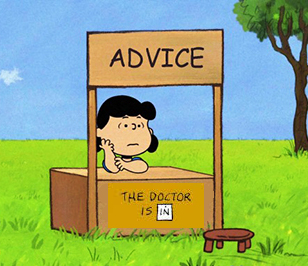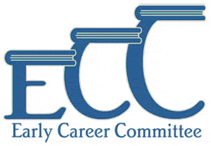
Asked and Answered | October 2, 2015

What is the best piece of advice you have received thus far in your career?
“I have two favorites, so instead of picking one I’m going to share both! The first is from my first boss, and it’s basically that relationships are everything. That may seems pretty generic, but since my job as a publicist breaks down to having strong relationships with authors, editors, agents, media, etc., it’s been something that’s really stuck with me. Specifically, my boss encouraged me to set up as many face-to-face meetings as possible, as soon as possible, to really set a good foundation for any future communication. Plus, people are much more likely to help you out when you need it if you’ve worked on building a personal connection!
The second piece is probably my favorite, and is from my current boss: “The only way out is through.” Also, “No is a complete sentence.” I think both speak pretty firmly for themselves, but they’re probably the best bits of advice I’ve gotten. I also may or may not have them printed out and posted on the bulletin board above my desk.” –Nicole Banholzer, Publicist at Macmillan Children’s Publishing Group
“When I first started as an editorial assistant at St. Martin’s Press, a senior-level editor told me that an editor should always try to have a phone conversation (or in-person conversation) with an author before making an offer on the author’s book. An actual conversation, as opposed to an email correspondence or communication via an agent, gives both the editor and the author a chance to connect and to decide if there is chemistry and a shared vision for the project. I’ve had some really great early conversations with authors, conversations that set us up for long and fruitful collaborations, and I’ve also had some calls that made me realize that I might not be the best fit for a project.” –Elizabeth Bewley, Executive Editor at Houghton Mifflin Harcourt Books for Young Readers
“It’s not about knowing all the answers, it’s about knowing how to search for them. In other words, use your resources. Your personal expertise has limits, but there isn’t a limit when it comes to learning from the experiences of others.”—Kara Brammer, Senior Marketing Associate at HarperCollins
“When starting out as an editor, other editors whom I admired encouraged me to network. Rejecting a submission but want to chat more with the agent? Ask them to coffee! See an interesting sounding project in Publishers Lunch? Ask the agent for a drink! “Networking” sounds pretty daunting to a newbie, but really it’s just talking books with like-minded peoplewho want to meet with you too. Feeling like I had “permission” and encouragement to reach out made all the difference. Plus, I’ve gotten acquisitions from these meetings. A win-win!” –Erica Finkel, Associate Editor at Abrams Books for Young Readers
“Michael Pietsch once said, ‘Whenever you speak or present in front of a group, try not to read from a paper but memorize what you are going to say. It helps keep you engaged with your audience and makes a world of a difference.’ I’ve done it for Focus and Sales Conference and it really works. I kept getting compliments.” –Nikki Garcia, Assistant Editor at Little, Brown and Company Books for Young Readers
“Always keep an open mind in terms of career direction. There’s much more to publishing than editorial. Everyone who touches a book, from manuscript to marketing campaigns, makes an impact in the life of that story.” –Alissa Nigro, Marketing Coordinator at Random House Children’s Books
“Don’t be too concerned with following a linear career path, especially early on; it’s often the seemingly random detours that will lead you to the most interesting places. Instead, try to think of your career as a series of experiences: opportunities to learn new things, develop useful skills, and make meaningful connections. Also, aim to be strategic and analytical in your thinking: These will be key factors in developing and defending your ideas.” –Caite Panzer, Director of Rights and Global Publishing Strategy at Scholastic
“The first advice I’ve taken to heart is a quote by Antoine de Saint-Exupery that says, “A designer knows he has achieved perfection not when there is nothing left to add, but when there is nothing left to take away.” The second most important advice I’ve heard was Neil Gaiman’s MAKE GOOD ART speech. I wish someone had given me that speech earlier in my career, and I encourage everyone in any field of the Arts to read it, regardless of whether you’ve just started or have many years under your belt. You won’t regret it.” –Sharismar Rodriguez, Associate Art Director at Clarion Books/Houghton Mifflin Harcourt Books for Young Readers
“What has stood me in good stead over the years is the old adage ‘measure twice, cut once.’ Whether editing a manuscript or writing an email to an author, agent, or colleague, being thoughtful and thorough—measuring twice—before finalizing something has always helped me.” –Reka Simonsen, Executive Editor at Atheneum, Simon & Schuster
“I thought about this a lot and couldn’t narrow it down to just one! So here are the top three pieces of advice given to me when I first started out that made the most lasting impressions. The first is don’t burn your bridges. There is a crazy story behind that, but it’s not mine to tell! I’ll just say that book publishing is a small industry and, if you decide to stay in it, you will run into familiar faces again and again. It’s essential to try and leave positive impressions and not to be disrespectful or aloof to those you may meet in passing, work with directly or indirectly, and even those who interview you for a job you may not take or be offered. You will inevitably see those people again, and if you can approach them with kindness and confidence it will only help you.
The second piece of advice was one that was tough to hear at the time. I was working as a design assistant at HarperCollins, when the head of managing editorial pulled me aside and told me that if I slowed down a little I would stop making so many mistakes. I was eager to get my work done quickly but instead of making a good impression, it was causing more work for everyone else. Since then I try to make it a point to double check everything I do so I can be viewed as dependable and not someone who does things quickly just to get them done.
The third piece of advice came from my dad when I was just starting out. He said dress for the job you want, not the job you have. The industry has become more casual over the years so at times dressing up seems dated, but the way I look at it is you never know who you might have the opportunity to meet on any given day, or what kind of a meeting you might be invited to join.” –April Ward, Art Director at Macmillan Children’s Publishing Group







